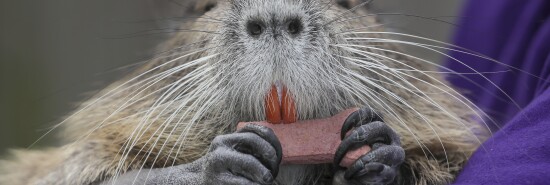
Nutria? Sweet! (A saccharine story)
Quin Hillyer
Don’t mess with an American’s pet. Just don’t do it. And if that pet happens to be a swamp rat, you’ll arouse some ragin’ Cajuns.
The tale of Neuty, the pet nutria, was all over the news in Louisiana in mid-March. For the uninitiated, nutria look a lot like beavers, except with big, ugly rat tails instead of beavers’ broad, flat appendages. Unlike beavers, though, they are generally hated. Native to South America but brought to Louisiana in the 1930s for their fur, they escaped into the marshes and began destroying wetlands at a furious pace. They eat vast amounts of aquatic vegetation, including the roots that otherwise would keep the soil in place, and they even destroyed large parts of the drainage system in Jefferson Parish, Louisiana. A local news article described them as “about as desirable as cockroaches and cottonmouth [poisonous snakes].”
Louisianans have tried all sorts of methods to control these rodents’ populations: nutria hunts, attempted nutria recipes (ugh: not successful), you name it. Nothing works.
Yet when New Orleans-area restaurateur Denny Lacoste saw a baby nutria stranded in the rain in 2020, near its siblings run over by a passing car, he rescued it and took it home, where he and his wife, Myra, kept it alive with a product known as “kitten milk replacement.” To make a much longer story short, little Neuty became a wonderful pet, smart and loving and (except for the tail) adorable. He swims in the Lacostes’ pool, plays with their dog, cuddles with family and friends, makes his own nest each night with towels he drags into the bathroom, and doesn’t even leave a mess after being house-trained.
Trouble began, though, when the New Orleans Times-Picayune on March 15 did a fun feature story on Neuty. It turns out that it is illegal to keep nutria as pets. Within days, agents from the Louisiana Department of Wildlife and Fisheries showed up to confiscate Neuty to take him to a zoo.
The state’s DWF agents have been considered heroes since they rescued thousands of people after Hurricane Katrina in 2005, but suddenly, thousands more were signing angry petitions demanding that the agents let the Lacostes keep Neuty. Some likened DWF almost to a Gestapo.
Public pressure worked: The department backed down, issuing the Lacostes a special permit for Neuty on the condition that the critter receive regular veterinary visits and be disallowed from fondling by patrons of the Lacostes’ restaurant.
The lesson is that if you want wildlife officials to back down, get the media to rile up support for your critter. Yet that tactic can go only so far. Somehow it’s unlikely the public will rally around your pet cottonmouths or your pet Periplaneta americana, commonly known as the American cockroach, no matter how cute you think they are.
